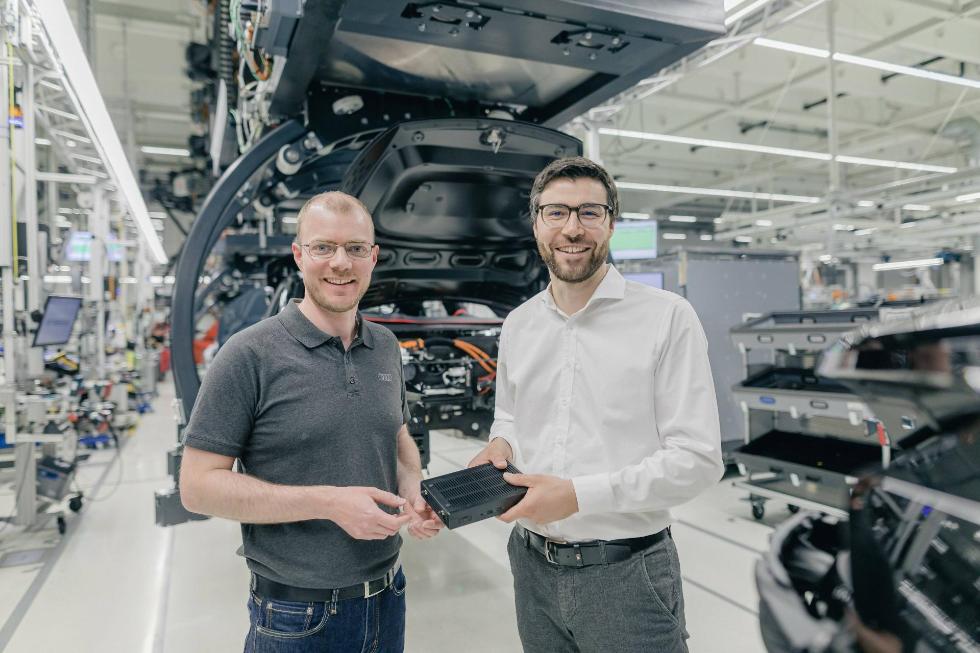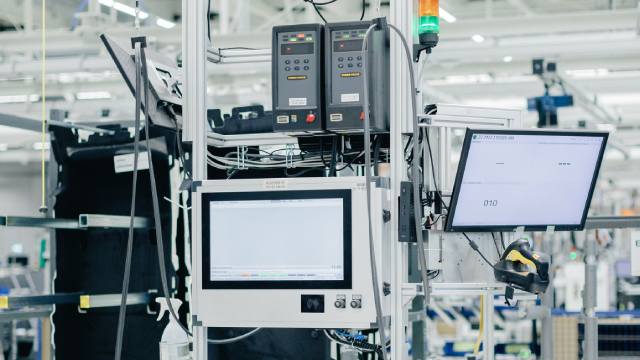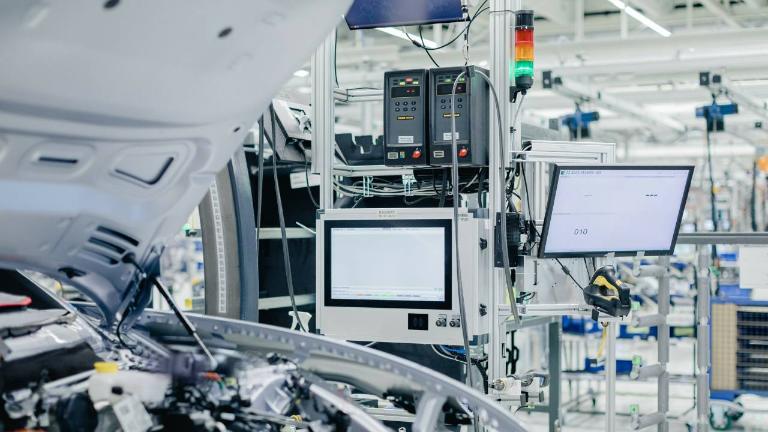The Edge Cloud 4 production platform enters Audi's series production
One year after the start of the pilot project and following successful testing, the implementation of the Edge Cloud 4 Production system has begun to support employees on the assembly line at Böllinger Höfe.
Audi's focus on innovation extends beyond vehicles to industrial processes and automation. Therefore, since July 2022 Audi has been testing the Edge Cloud 4 Production (EC4P) local server at the Böllinger Höfe plant. This is a new method of automating production lines based on the latest IT resources, which debuted for the first time in series production in July 2023.
At the German site, a local server cluster controls the worker support systems for two production cycles of the Audi e-tron GT quattro, RS e-tron GT and R8 models. In the future, this flexible and scalable solution will replace the decentralized control system using industrial PCs, which require a lot of maintenance. The ECP4 server, on the other hand, allows the redistribution of computing power required by each production line to local data processing centers. In addition to this application, the Audi Production Lab is further developing the EC4P server for other use cases.
All the benefits of the cloud
The Edge Cloud 4 Production solution uses local servers that serve as data processing centers and can handle a large amount of production-related information with low latency, which is then distributed to support systems for specialized technicians who indicate to each worker which vehicle part to install.
"Our motto is software, not hardware" explain Sven Müller and Philip Saalmann, Head and Co-head of the 20-member EC4P project team. "This solution allows us to quickly integrate new tools into the software, both to support colleagues and to control the assembly of components, as well as vehicle diagnostics, predictive maintenance, and energy savings" Müller adds. By eliminating industrial PCs, the risk of malware attacks is reduced: "Implementing local cloud solutions in the plants allows us to leverage advances in digital control systems" says Jörg Spindler, Head of Production Planning and Production Technology at Audi.

Revolutionizing production
The server solution makes it possible to balance demand spikes across all virtualized clients, speeding up the distribution of applications and ensuring more efficient use of resources. Additionally, it reduces production costs, particularly in software implementations, upgrades to the operating system, and IT-related expenses in general.
Flexible cloud technology is also well suited to the activities of the near future: "What we are doing here is a revolution, and this initial application at Böllinger Höfe is a crucial step toward IT- based production" emphasizes Gerd Walker, Member of the Board of Management of AUDI AG for Production and Logistics.
From small to large series
The ECP4 solution went into series production in July 2023 after passing a series of preliminary tests. "Due to its low production volumes, Böllinger Höfe is the ideal plant to test the ECP4 and evaluate its results for large-scale deployment" explains Saalmann, who then highlights how Audi is the first automaker to use a centralized server solution that redistributes computing power across a production cycle.
For instance, production cycles 18 and 19, during which interior panels are installed and underbody work is done, use so-called thin clients powered directly by the Ethernet network: these are terminal devices that receive data through local servers and energy via network cables.

Agile and scalable architecture
By the end of 2023, server-based work support systems will be implemented for all 36 production cycles. Rapid deployment is enabled by the server architecture itself, which is designed to scale rapidly in series production.
"EC4P allows us to merge automation technology and IT, advancing our practical use of the Internet of Things" explains project manager Müller further. "This development will also create new employee roles at the interface of production and IT, with employees being able to use new applications to control automation technology. That is why we are setting up a control team with global expertise to supervise and monitor the EC4P system around the clock”. The team will work closely with the line employees.
Automotive Initiatives
Audi is studying the impact of digital innovations on the work environment as part of the Automotive Initiative 2025, in collaboration with partners including the Fraunhofer Institute for Industrial Engineering. The AI25 takes a holistic approach, giving equal consideration to technology, people and Audi's mission to advance digitization in production.
"The goal is to free up resources for new areas such as battery production. Our team will have to acquire new skills required by new technologies and collaboration models. This is why qualifications are crucial, and the Böllinger Höfe plant, with its longer time cycles, is a great learning environment to then roll out this innovation in larger plants such as Ingolstadt and Neckarsulm" Splinder concludes.
Body shop department
One of the first implementations will be the control of electrical commissioning activities at Audi's German sites. After EC4P has been tested in assembly, the next step will involve the server managing the previously hardware-based programmable logic controller (PLC) in the automation cells for body construction. The project team is developing and testing the software together with three manufacturers at the EC4P project house in Ingolstadt.
Source: AUDI AG
VGI | Responsible OU: VP | Creation date: article date | Class 9.1
